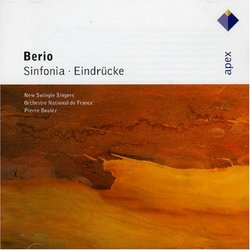| All Artists: Berio, Boulez, Orch National De France Title: Berio: Sinfonia / Eindrucke Members Wishing: 0 Total Copies: 0 Label: Wea Apex Classics UK Original Release Date: 1/1/2006 Re-Release Date: 4/14/2006 Album Type: Import Genre: Classical Style: Number of Discs: 1 SwapaCD Credits: 1 UPCs: 0685738922628, 685738922628 |
Search - Berio, Boulez, Orch National De France :: Berio: Sinfonia / Eindrucke
 | Berio, Boulez, Orch National De France Berio: Sinfonia / Eindrucke Genre: Classical
|
Larger Image |
CD Details |
CD ReviewsBerio's masterpiece and another fine work, but get the budge Christopher Culver | 01/21/2007 (4 out of 5 stars) "This disc of two Luciano Berio works in performance by the Orchestre National de France and Pierre Boulez was originally released on Erato in 1986. Thankfully, Warner Classics reissued it at budget price in 2001 in their "Apex" line, a bargain which the contemporary music afficionado should seek out. As you shall see, I do not think this disc has the best performance of a key Berio work, but nonetheless it has much to recommend itself.
"Sinfonia" for eight voices and orchestra (1968-69) is one of Luciano Berio's greatest works, vast in its proportions and in the musical traditions it incorporates. The eight voices are meant to be jazz singers, and Berio wrote the piece for the Swingle Singers, who appear here in a later lineup. The first two movements are quiet and mysterious. In the first, the singers gently intone selections from Levi-Strauss' retellings of Brazilian myths, made so vague that only the phonetic properties matter. In the second movement "O King", an orchestration of an earlier independent work, the singers slowly build up to the name "Martin Luther King", who had been murdered the year before. The third movement of "Sinfonia", the extroverted "In ruhig fliessender Bewegung", is the most famous. The skeleton of the work is the second movement from Mahler's "Resurrection" symphony, a little cut-up and reordered. Over this, Berio has a tenor reciting text taken mainly from Samuel Beckett's "The Unnamable" and Berio's own journalistic writings, and the orchestra responds with quotations from fifteen composers. For example, when the narrator uses the term "the lowing cattle, the rush of the stream", we hear part of Beethoven's "Pastorale" symphony, while a singer's cry "This is nothing but an academic exercise" is ironically accompanied by music by Hindemith. Every listener has his own favourite part of this movement, mine is when the narrator says "I have a present for you" and the orchestra responds with that big tutti chord that opens Boulez' "Don" (which is to say "Gift"). The fourth and fifth movements return to a subdued tone. The fourth brings back Levi-Strauss references and is rather brief. But for all my initial passion about the third movement, I find it is the fifth which is the most intriguing and satisfying. Originally "Sinfonia" was written in four movements, but after the first performance, Berio was unhappy that these four movements were not reconciled to each other. In the fifth movement he subsequently wrote, therefore, we hear references in the form of quotation and harmonic development to the original four movements, a savage mix of voices, confused percussion, and threatening trombones a la Per Norgard's fifth symphony. A splendid end to a massive work. For a long time, this was *the* recording of the "Sinfonia" to have. However, I must say I find it superseded by that on Deutsche Grammophon in the "20/21" series, where Peter Eotvos leads the Goteborgs Symfoniker. In the third movement, Eotvos keeps it going at a very nice clip, creating a dizzying parade of images. Boulez, on the other hand, keeps things quite slow; if one has already heard the Eotvos recording, terms like "molasses" come to mind. Also, Ward Swingle's narration, while it might have worked for Berio in forty years ago, now makes this sound like a dated '60s happening, and the Eotvos performance Nonetheless, Boulez's handling of the other four movements is quite fine, and I certainly invite Berio fans to get this. The liner notes for "Sinfonia" consist only of Luciano Berio's own programme note, which covers all the basics. However, those enraptured by the piece would do well to seek out David Osmond-Smith's PLAYING ON WORDS: A Guide to Luciano Berio's 'Sinfonia' (University of Chicago, 1987) ISBN 0947854002. Even if the performance of "Sinfonia" is not my favourite, the following "Eindrucke" for orchestra (1973-74) is very entertaining. Where does one go after one has reconciled himself to the whole classical tradition, giving birth to the first postmodern symphony? Evidentally back to modernism, but of a fresh new type. "Eindrucke" is a quintessential 1970s Berio piece, interested in organically generating material from strict processes, while still remaining dramatic and easily accessible.. I should add that this is an IRCAM recording, meaning that these two works appear in crystal-clear sound. Bottom line: get the Eotvos recording and this, and enjoy a thrilling tour de force of the 20th-century music." |

 Track Listings (6) - Disc #1
Track Listings (6) - Disc #1